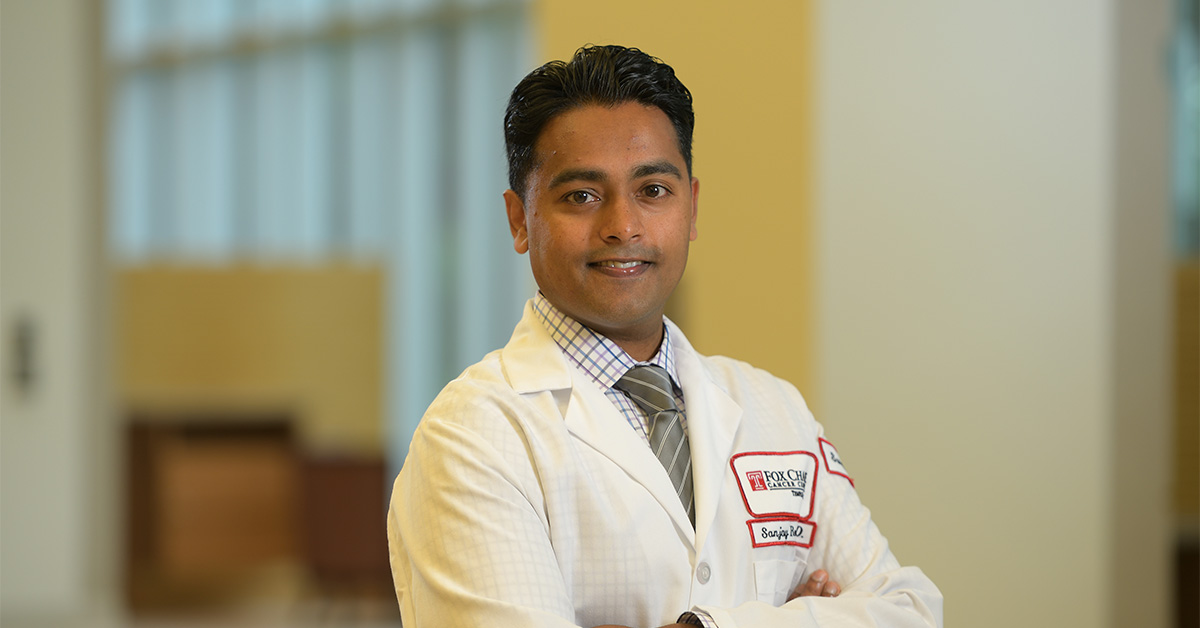
PHILADELPHIA (August 9, 2023) — Sanjay S. Reddy, MD, FACS, an Associate Professor in the Department of Surgical Oncology at Fox Chase Cancer Center, has received an Investigator Initiated Clinical Trial grant from Fox Chase’s Office of Sponsored Research to study the impact of diet and lifestyle factors on pancreatic ductal adenocarcinoma, or PDAC, the most common form of pancreatic cancer.
“This study engages the dynamic nature of this disease and aims to measure the significance of diet and lifestyle, and its relationship to the microbiome, by assessing multiple tissue samples across the spectrum of the patient’s cancer journey,” Reddy said. Reddy, who is also the Marvin S. Greenberg, MD, Chair in Pancreatic Cancer Surgery, noted that the study will draw on expertise from across multiple disciplines at Fox Chase and include basic scientists, population scientists, and clinicians.
PDAC accounts for more than 90% of all pancreatic cancers. It is the fourth most frequent cause of cancer-related deaths worldwide, with a five-year overall survival rate of approximately 12% in the United States. The incidence of PDAC is rising, with projections indicating a more than two-fold increase within the next 10 years.
Previous research conducted by Reddy’s group at Fox Chase has shown that environment and biology likely play a role in PDAC.
Based on these findings, the Fox Chase team posits that the environment in which people live, including their access to healthy food and recreation, influences both their lifestyle and diet. This influences pancreatic inflammation and the pancreatic stroma, the connective tissue supporting the pancreas. These factors, in turn, affect the tumor microbiome, which comprises the fungi and bacteria present in tumors, which ultimately affects PDAC development.
The two-year study has three aims:
- First, establish the feasibility of PDAC biological sample and data collection. Researchers will test a standardized method of collecting data on patient lifestyle, diet, and location of residence, coupled with the collection of blood, stool, saliva, and solid tissues. If successful, this method will be used as the basis for future grant applications. The researchers intend to include 20 patients, enrolling them from areas served by both Fox Chase and Temple Health.
- Second, determine how the PDAC microbiome shapes cellular composition of the tumor and adjacent healthy pancreatic tissues. Researchers will identify PDAC-unique local and systemic microbial species and correlate them with the microbial DNA fragments in matched blood samples. Analyses of tumor microbiomes and the composition of PDAC cells and adjacent benign tissues will be correlated to PDAC progression and response to treatments.
- Third, determine the effect of patient lifestyle and environment on PDAC tumors. The tumor’s microenvironment—the ecosystem that surrounds it—and its microbiome will be linked to dietary macronutrients such as fats and sugars, lifestyle factors such as smoking and alcohol, and quality metrics of the macroenvironment such as poverty, access to green space, and recreation.